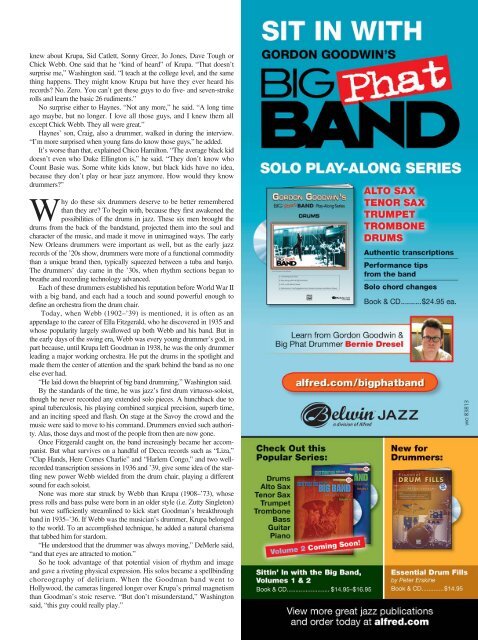Download - Downbeat
Download - Downbeat
Download - Downbeat
- No tags were found...
Create successful ePaper yourself
Turn your PDF publications into a flip-book with our unique Google optimized e-Paper software.
knew about Krupa, Sid Catlett, Sonny Greer, Jo Jones, Dave Tough orChick Webb. One said that he “kind of heard” of Krupa. “That doesn’tsurprise me,” Washington said. “I teach at the college level, and the samething happens. They might know Krupa but have they ever heard hisrecords? No. Zero. You can’t get these guys to do five- and seven-strokerolls and learn the basic 26 rudiments.”No surprise either to Haynes. “Not any more,” he said. “A long timeago maybe, but no longer. I love all those guys, and I knew them allexcept Chick Webb. They all were great.”Haynes’ son, Craig, also a drummer, walked in during the interview.“I’m more surprised when young fans do know those guys,” he added.It’s worse than that, explained Chico Hamilton. “The average black kiddoesn’t even who Duke Ellington is,” he said. “They don’t know whoCount Basie was. Some white kids know, but black kids have no idea,because they don’t play or hear jazz anymore. How would they knowdrummers?”Why do these six drummers deserve to be better rememberedthan they are? To begin with, because they first awakened thepossibilities of the drums in jazz. These six men brought thedrums from the back of the bandstand, projected them into the soul andcharacter of the music, and made it move in unimagined ways. The earlyNew Orleans drummers were important as well, but as the early jazzrecords of the ’20s show, drummers were more of a functional commoditythan a unique brand then, typically squeezed between a tuba and banjo.The drummers’ day came in the ’30s, when rhythm sections began tobreathe and recording technology advanced.Each of these drummers established his reputation before World War IIwith a big band, and each had a touch and sound powerful enough todefine an orchestra from the drum chair.Today, when Webb (1902–’39) is mentioned, it is often as anappendage to the career of Ella Fitzgerald, who he discovered in 1935 andwhose popularity largely swallowed up both Webb and his band. But inthe early days of the swing era, Webb was every young drummer’s god, inpart because, until Krupa left Goodman in 1938, he was the only drummerleading a major working orchestra. He put the drums in the spotlight andmade them the center of attention and the spark behind the band as no oneelse ever had.“He laid down the blueprint of big band drumming,” Washington said.By the standards of the time, he was jazz’s first drum virtuoso-soloist,though he never recorded any extended solo pieces. A hunchback due tospinal tuberculosis, his playing combined surgical precision, superb time,and an inciting speed and flash. On stage at the Savoy the crowd and themusic were said to move to his command. Drummers envied such authority.Alas, those days and most of the people from then are now gone.Once Fitzgerald caught on, the band increasingly became her accompanist.But what survives on a handful of Decca records such as “Liza,”“Clap Hands, Here Comes Charlie” and “Harlem Congo,” and two wellrecordedtranscription sessions in 1936 and ’39, give some idea of the startlingnew power Webb wielded from the drum chair, playing a differentsound for each soloist.None was more star struck by Webb than Krupa (1908–’73), whosepress rolls and bass pulse were born in an older style (i.e. Zutty Singleton)but were sufficiently streamlined to kick start Goodman’s breakthroughband in 1935–’36. If Webb was the musician’s drummer, Krupa belongedto the world. To an accomplished technique, he added a natural charismathat tabbed him for stardom.“He understood that the drummer was always moving,” DeMerle said,“and that eyes are attracted to motion.”So he took advantage of that potential vision of rhythm and imageand gave a riveting physical expression. His solos became a spellbindingchoreography of delirium. When the Goodman band went toHollywood, the cameras lingered longer over Krupa’s primal magnetismthan Goodman’s stoic reserve. “But don’t misunderstand,” Washingtonsaid, “this guy could really play.”
















